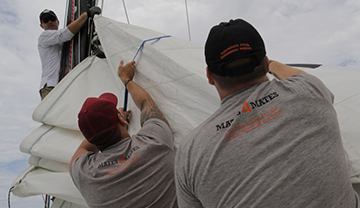It’s our national bloke greeting, offered with a smile and an outstretched paw at pubs, bbq’s and man gatherings all over Oz. Most people agree mateship is at the core of what it means to be Australian. It’s hard to put your finger on exactly why, but it’s hard to understand the physics behind a Shane Warne leg-break and we accept that, because we’ve seen it.
The term mate is believed to have originated on The First Fleet. Convicts were forbidden from using their names, so they began calling each other mate (from “shipmate”). And in true, smart-arse Aussie style, they also started calling the officers mate; as if to say – you’re no better than me, you cat-o-nine-tails wielding prick!
Fast forward two hundred and thirty odd years and mateship is at the core of how we see ourselves as a nation. Most men like to think of themselves as being “a good mate” to their friends, but what does that actually mean in this day and age?
There’s some obvious traits; never bailing on a shout, helping your mates move house and, of course, using NON permanent marker to draw a Wang on a mate’s forehead when he passes out after a night on the tins (only a dick draws a dick with a Sharpie!).
Pretty simple, really.
But then there’s the biggie. The number one thing you’re meant to be able to offer your mates – support when they need it. Aussie men excel at the day to day of mateship, but often aren’t there to lend a hand when a friend is doing it tough emotionally, because they don’t know their mate needs help.
For years, our image of masculinity has been defined by physical toughness, self-reliance and emotional stoicism – when you have a problem, you just “deal with it”. But this tendency to bottle everything up has contributed to a rise in men’s mental health issues; and an alarming suicide rate that sees five men take their lives every day in Australia. So many lives tragically cut short because we’ve been taught that “real men” don’t ask for help.
But across Australia, support groups are starting to change this outdated view of masculinity. And the charge is being lead by some of the most blokey industries. Reacting to the alarming statistic that construction workers are six times more likely to suicide than to die from an on site accident, Mates in Construction is busy knocking down emotional walls on building sites across Australia to improve workers’ mental health.
Another job where physical danger overshadows potential mental health risks is the armed forces. Mates 4 Mates (M4M) is a national charity that assists soldiers who’ve been wounded or become ill as a result of their service. The most common thing M4M helps veterans with is Post Traumatic Stress Disorder (PTSD).
One way M4M helps treat PTSD is through adventure challenges, such as sailing. Known as diversional therapy, these challenges break down barriers and help veterans connect with each other. Obviously just hoisting the mainsail doesn’t cure PTSD, but the challenges play an important role in building confidence, trust and improving the mental well-being of veterans.
For most people a rough day at the office means a paper-jam in the printer; for soldiers it can mean dealing with an improvised explosive device. Understandably, they often find it hard to relate to “civvies”. But veterans say they feel safe at M4M because most staff have had military experience. This speaks directly to the military bond of brotherhood, or to use a more Australian term – mateship.
It was the actions of the Diggers in WWI that cemented mateship as a defining Australian characteristic. The bond these men formed during battle is often said to be the only thing that got them through. In the face of unimaginable suffering these brave blokes found a way to endure through the shared strength of the man next to them in the trench.
This same bond – mateship – is now helping Australia fight a national mental health crisis. The enemy might not be as easy to see, but this battle claims the lives of over two-thousand Australian men every year, so if you think you have a mate who might need support, make sure you reach out and offer yours.
It’s what mates do.
This article was first published on www.manup.org.au.
Visit weneedtotalk.movember.com for help on how to reach out, and for details of local 24-hour crisis support services if you need to speak with someone immediately.


.jpg)





